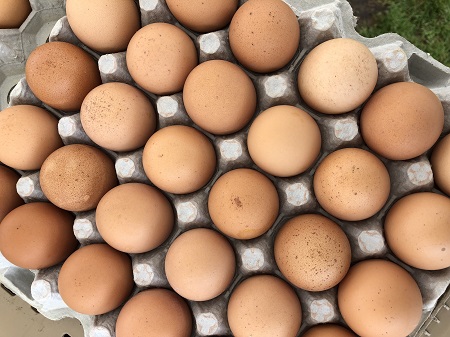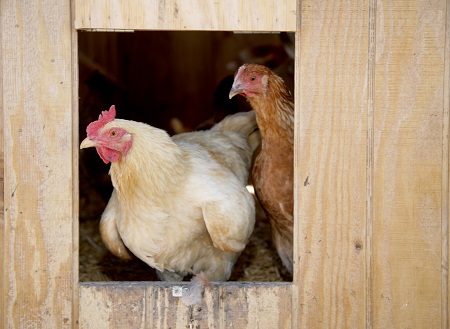Selling Eggs

Produce and sell eggs with quality and safety in mind.
Egg producers, intermediaries, and consumers in Alaska can all contribute to protecting public health and providing a safe local egg supply to consumers across the state.
- Questions about selling eggs?
- Contact your local Environmental Health Officer.
On This Page
Egg Sales in Alaska
Regulated Egg Sales
Certain types of egg sales are regulated in Alaska in order to protect the health of consumers. The sale of eggs is regulated if the eggs are not sold by the producer directly to the consumer. The following activities are regulated:
- A producer selling eggs to an intermediary: The producer sells the eggs to someone who is not the final consumer
- An intermediary selling eggs: Someone who is not the producer sells the eggs to the final consumer, a repacker, or a retail store
The Department of Environmental Conservation and the Department of Natural Resources are responsible for regulating these types of food and agricultural sales.
Exempt Egg Sales
The sale of eggs by the producer directly to the consumer is an exempt activity that is not regulated by the state of Alaska. This includes producers selling eggs on their farm, at a farmers market, and at roadside stands directly to the final consumer.
Egg Cleaning and Storage
Any time eggs are produced and sold, it is important to keep the safety of animals, people, and the environment in mind. The information below describes methods for cleaning and storing eggs in ways that reduce contamination and limit the growth of dangerous bacteria.
Collect eggs and brush off debris on the shell
- Put eggs in an easy-to-clean container
- Avoid containers made of materials that are difficult to clean and disinfect
Do not cool eggs rapidly before they are cleaned
- As the egg cools, the eggshell will contract and pull dirt or bacteria on the surface deep into the pores
- Try to keep the eggs at a relatively constant temperature until they are washed
Wash eggs as soon as you collect them
- This helps limit contamination
Wash eggs with water that is at least 90 degrees Fahrenheit
- The warm water will make the egg contents swell and push the dirt away from the pores of the egg
- If necessary, a mild detergent approved by FDA for washing eggs can be used

Do not let eggs soak in water
- Soaking eggs in water for as little as one to three minutes can allow bacteria to penetrate the shell
Eggs may be sanitized
- Sanitize eggs to further reduce bacteria numbers on the shell
- Use one tablespoon of unscented household chlorine bleach per one gallon of water
Cool and dry eggs quickly after washing
- Store eggs with their large end up at 45 degrees Fahrenheit and 70 to 85 percent humidity
- A temperature of 45 degrees Fahrenheit or below will reduce the growth of bacterial pathogens, such as salmonella
- Eggs stored properly will maintain their quality
- Eggs stored at warmer temperatures can drop in quality over time and fertilized eggs may develop embryos at temperatures above 85 degrees Fahrenheit
Date the carton
- Use or sell the oldest eggs first and rotate your extra eggs
- Try to use or sell all eggs before they are three weeks old
Cleaning and Storage Checklist
- Collect eggs in an easy-to-clean container
- Brush off debris on the shell
- Do not cool eggs rapidly before they are cleaned
- Wash eggs as soon as you collect them
- Wash eggs with water that is at least 90 degrees Fahrenheit
- Do not let eggs soak in water
- Sanitize eggs, if necessary or desired
- Cool and dry eggs quickly after washing
- Store eggs with the large end up at 45 degrees Fahrenheit and 70 to 80 percent humidity
- Do not store eggs at temperatures above 45 degrees Fahrenheit
- Date the carton

Selling Eggs Directly to Consumers
Producers selling eggs directly to the end consumer is not a regulated activity, however, it is still important to maintain safe food practices.
Follow the steps listed above to properly clean and store the eggs
- These methods will help maintain the quality of the eggs and prevent contamination and the growth of harmful bacteria that can make people sick
Keep eggs at a temperature at or below 45 degrees Fahrenheit
- If you are selling at a location other than the farm, the eggs can be kept under refrigeration until transport and transferred to a cooler with gel packs
- If sold at a farmers market or roadside stand, using a small refrigerator or plug-in cooler is the best option
- A thermometer should be placed in the cooler or refrigerator so the holding temperature of the eggs can be monitored
Selling Eggs to an Intermediary or an Intermediary Selling Eggs to the Final Consumer
Any time eggs are not sold by the producer directly to the consumer, the egg sale is under the jurisdiction of the Alaska Food Code and the Shell Egg Regulations.
Clean and store eggs properly
- Follow the steps listed above to properly clean and store the eggs
Keep eggs at a temperature at or below 45 degrees Fahrenheit
- The eggs must be transported to the intermediary in refrigerated equipment that maintains a temperature at or below 45 degrees Fahrenheit
- Place a thermometer inside the refrigerated equipment to monitor the temperature during transport
Label eggs according to regulation
To be in compliance with food labeling laws and relations, the following information must be included on the label and be written in English using a font size at least one-quarter inch tall:
- Statement of identity: Identify the product in the container (eggs)
- Grade and size/weight class: Eggs must be graded and weighed, learn more from the Cooperative Extension Service or the USDA Egg Grading Manual
- Numeric count: The number of eggs in the container (e.g., one dozen)
- Name and address of the producer, distributor, packer, or retailer: If the name on the label has a street address that is easily looked up or well known, only the city, state, and zip code need to be included; otherwise, the full street address must be included
- "Keep Refrigerated": Use these exact words
- Safe handling instructions: The statement below must be written in its entirety on the label
- Safe Handling Instructions
- To prevent illness from bacteria: keep eggs refrigerated, cook eggs until yolks are firm and cook foods containing eggs thoroughly.
Regulatory References
- 11 AAC 32.110 Shell Egg Regulations
- 18 AAC 31 Alaska Food Code
- 18 AAC 31.200(c) Food Condition and Source
- 18 AAC 31.230(1)(C) Temperature and Time Control: Receiving and Thawing
- 18 AAC 31.234(1)(B) Time and Temperature Control: Hot- and Cold-Holding, Cooling, and Reheating for Hot-Holding
Resources and Contacts
Resources
- Safe Egg Handling for Small Egg-Laying Flocks and Operations
- A publication of the Cooperative Extension Service in partnership with the Department of Environmental Conservation and the Department of Natural Resources
- Shell Eggs from Farm to Table
- Information from the United States Department of Agriculture
- Egg Grading Manual
- A publication of the United States Department of Agriculture
Contacts
- Food Safety and Sanitation
- Find your local Environmental Health Officer
- Office of the State Veterinarian
-
- 5251 Dr. Martin Luther King Jr. Avenue
- Anchorage, Alaska 99507
- 907-375-8215
- Alaska Division of Agriculture
-
- 1801 S. Margaret Drive, Suite 12
- Palmer, Alaska 99645
- 907-745-7200
- Cooperative Extension
-
- 308 Tanana Loop, Room 101
- P.O. Box 756180
- Fairbanks, Alaska 99775
- 907-474-5211
- ces@alaska.edu

 Indicates an external site.
Indicates an external site.